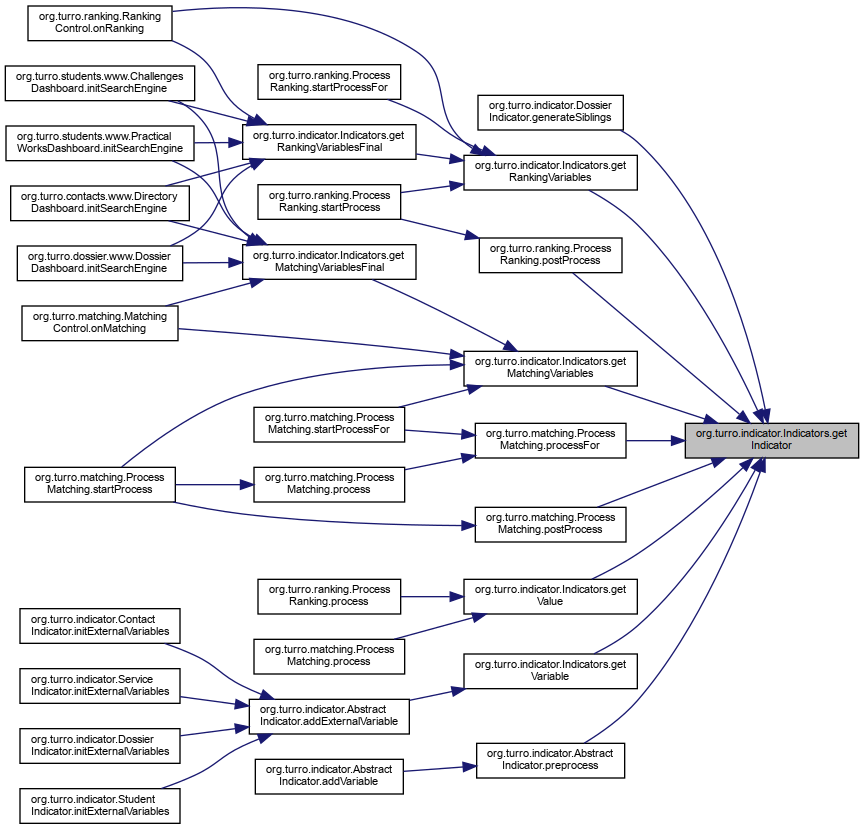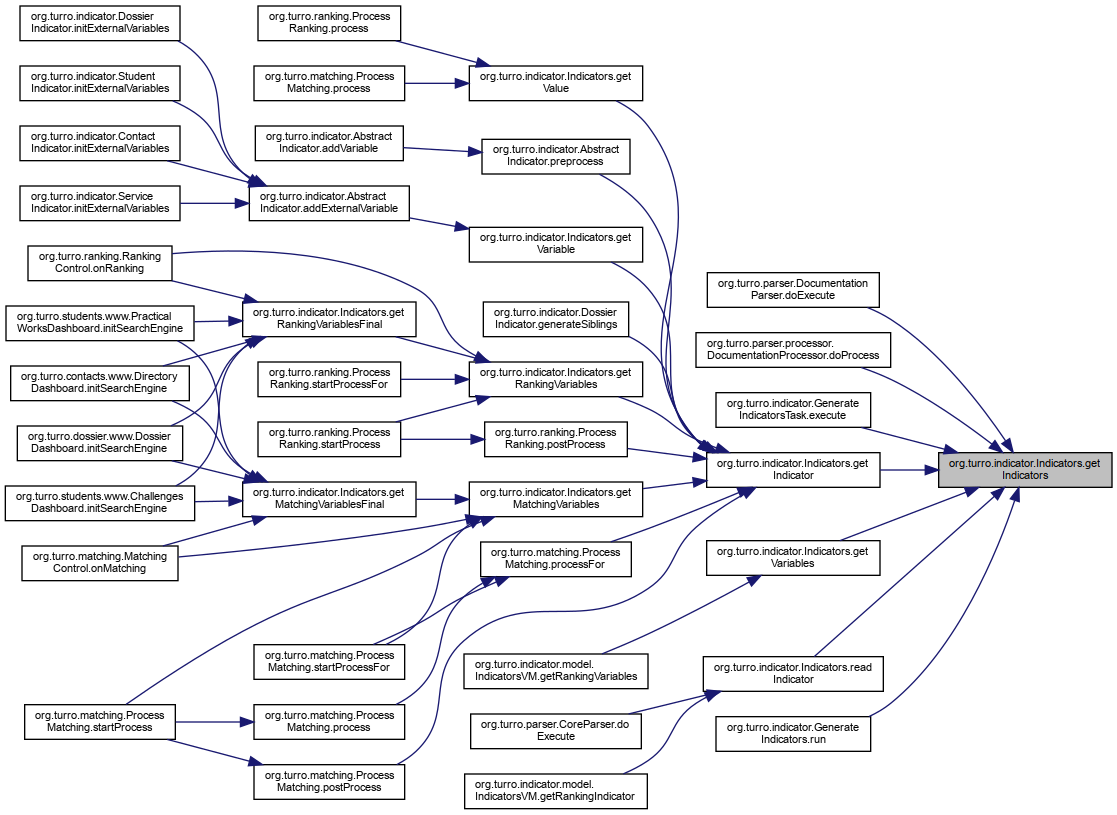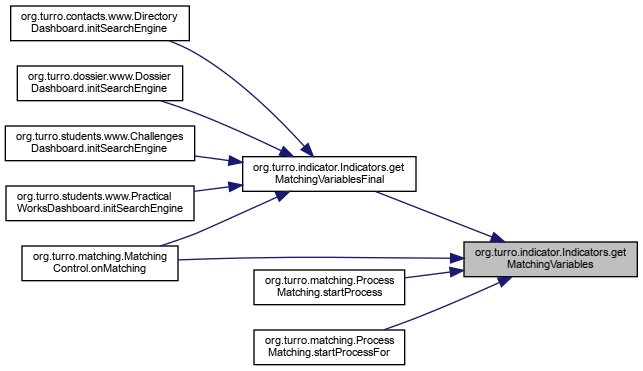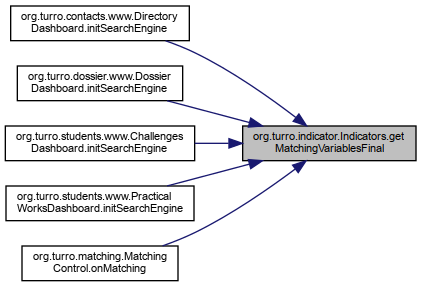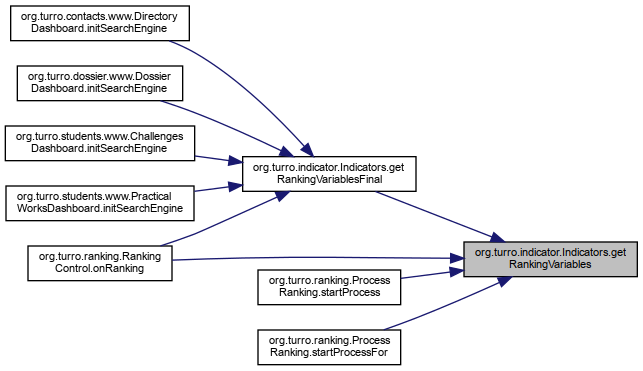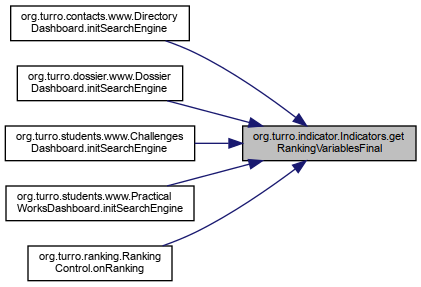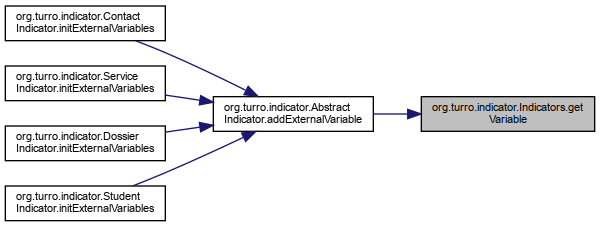- Author
- Lluis Turró Cutiller lluis.nosp@m.@tur.nosp@m.ro.or.nosp@m.g
Definition at line 34 of file Indicators.java.
◆ getIndicator() [1/2]
Definition at line 78 of file Indicators.java.
80 if(iIndicator.itsMine(variable)) {
static List< IElephantIndicator > getIndicators()
◆ getIndicator() [2/2]
◆ getIndicators()
Definition at line 138 of file Indicators.java.
139 if(_indicators ==
null) {
140 indicatorLock.lock();
142 if(_indicators ==
null) {
143 _indicators = Instances.cached().byAnnotation(ElephantIndicator.class, IElephantIndicator.class);
144 _indicators.stream().forEach(i -> i.initIndicator());
145 _indicators.stream().forEach(i -> i.prepareIndicator());
148 indicatorLock.unlock();
◆ getMatchingVariables()
| static List<IndicatorVariable> org.turro.indicator.Indicators.getMatchingVariables |
( |
String |
root | ) |
|
|
static |
Definition at line 47 of file Indicators.java.
49 return ei !=
null ? ei.getAllMatchingVariables(root): Collections.EMPTY_LIST;
static IElephantIndicator getIndicator(String root)
◆ getMatchingVariablesFinal()
| static List<IndicatorVariable> org.turro.indicator.Indicators.getMatchingVariablesFinal |
( |
String |
root | ) |
|
|
static |
Definition at line 58 of file Indicators.java.
60 variables.add(0, IndicatorVariable.result(root, VariableType.MATCHING_VARIABLE));
static List< IndicatorVariable > getMatchingVariables(String root)
◆ getRankingVariables()
| static List<IndicatorVariable> org.turro.indicator.Indicators.getRankingVariables |
( |
String |
root | ) |
|
|
static |
Definition at line 42 of file Indicators.java.
44 return ei !=
null ? ei.getAllRankingVariables(root): Collections.EMPTY_LIST;
◆ getRankingVariablesFinal()
| static List<IndicatorVariable> org.turro.indicator.Indicators.getRankingVariablesFinal |
( |
String |
root | ) |
|
|
static |
Definition at line 52 of file Indicators.java.
54 variables.add(0, IndicatorVariable.result(root, VariableType.RANKING_VARIABLE));
static List< IndicatorVariable > getRankingVariables(String root)
◆ getValue() [1/2]
| static double org.turro.indicator.Indicators.getValue |
( |
Object |
entity, |
|
|
IndicatorVariable |
variable |
|
) |
| |
|
static |
Definition at line 87 of file Indicators.java.
89 return ei !=
null ? ei.getValue(variable, entity) : 0.0;
◆ getValue() [2/2]
| static double org.turro.indicator.Indicators.getValue |
( |
Object |
entity, |
|
|
String |
relatedPath, |
|
|
IndicatorVariable |
variable |
|
) |
| |
|
static |
Definition at line 92 of file Indicators.java.
94 return ei !=
null ? ei.getValue(variable, entity, relatedPath) : 0.0;
◆ getVariable()
| static IndicatorVariable org.turro.indicator.Indicators.getVariable |
( |
String |
root, |
|
|
String |
name |
|
) |
| |
|
static |
Definition at line 64 of file Indicators.java.
66 return ei !=
null ? ei.getVariable(name) :
null;
◆ getVariables()
| static List<IndicatorVariable> org.turro.indicator.Indicators.getVariables |
( |
String |
indicatorClass | ) |
|
|
static |
Definition at line 124 of file Indicators.java.
126 if(iIndicator.getClass().getSimpleName().equals(indicatorClass)) {
127 return iIndicator.getAllVariables();
130 return Collections.EMPTY_LIST;
◆ hasDirectProcess()
| static boolean org.turro.indicator.Indicators.hasDirectProcess |
( |
List< IndicatorVariable > |
variables | ) |
|
|
static |
Definition at line 38 of file Indicators.java.
39 return variables.stream().anyMatch(v -> !v.isPreprocess());
◆ readIndicator() [1/2]
| static IndicatorResult org.turro.indicator.Indicators.readIndicator |
( |
String |
indicator | ) |
|
|
static |
Definition at line 99 of file Indicators.java.
100 if(!Strings.isBlank(indicator) && indicator.contains(
":")) {
101 String v[] = indicator.split(
"\\s*:\\s*");
102 if(!Strings.isBlank(v[0]) && !Strings.isBlank(v[1]) && !Strings.isBlank(v[2])) {
104 if(iIndicator.getClass().getSimpleName().equals(v[1])) {
105 return iIndicator.readIndicator(v[0], v[2]);
110 return new IndicatorResult(0, 0);
◆ readIndicator() [2/2]
| static IndicatorResult org.turro.indicator.Indicators.readIndicator |
( |
String |
jpaClass, |
|
|
String |
indicatorClass, |
|
|
String |
entityPath, |
|
|
String |
relatedPath, |
|
|
String |
indicator |
|
) |
| |
|
static |
Definition at line 113 of file Indicators.java.
116 if(iIndicator.getClass().getSimpleName().equals(indicatorClass)) {
117 return iIndicator.readIndicator(jpaClass,
118 Words.instance(
".", entityPath, relatedPath, indicator).toString());
121 return new IndicatorResult(0, 0);
The documentation for this class was generated from the following file:


